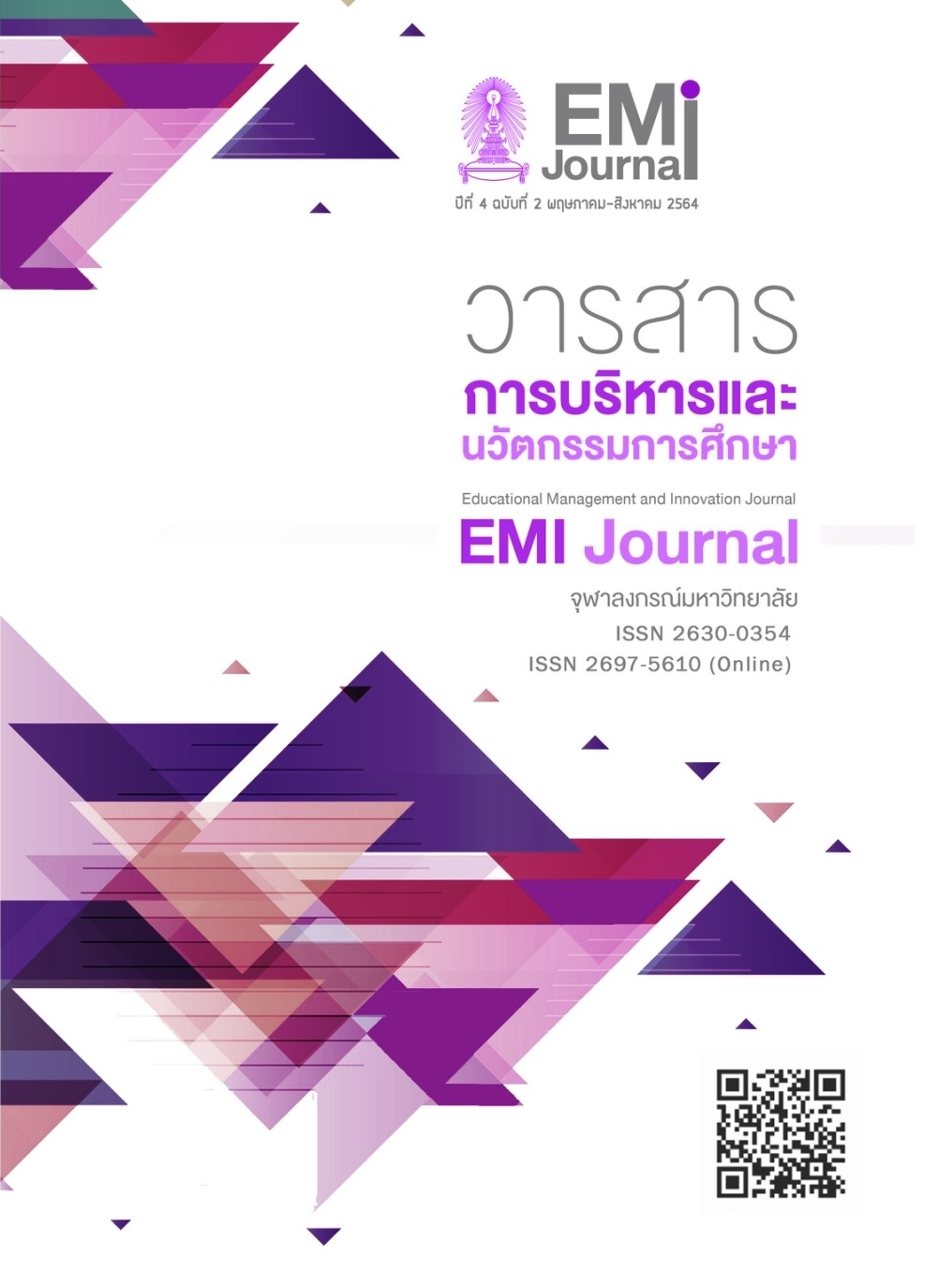Sunsermwit School’s Teacher Development Approaches Based on The Concept of Caring School Leadership
คำสำคัญ:
Teacher Development, Caring School Leadership, Caring Competenciesบทคัดย่อ
The purposes of this research were to 1) examine the actual and desirable states of Caring School Leadership’s competencies in Sunsermwit School’s teachers, and to study the competency with the highest development needs; and to 2) propose the school’s teacher development approaches based on the concept of Caring School Leadership. This is a descriptive research. The data were collected from 51 respondents including the school’s senior leaders and teachers. The research instruments were rating-scaled questionnaires and the suitability and feasibility assessments of the development approaches. The data were analyzed by using Frequency Distribution, Percentage, Mean, Standard Deviation, Mode, PNImodified, and content analysis.
The results were as follows: Overall, the actual state of caring competencies in Sunsermwit School’s teachers was at a medium level while the desirable state was at a high level. The highest development needs of the caring competencies for the teachers were in the Fourth Domain (Developing fellow teachers and students, and fostering school’s conditions conducive to the development and the expression of caring). There were 2 development approaches consisting of 8 sub-approaches and 26 development procedures for Sunsermwit School’s teacher development based on the concept of Caring School Leadership. Thus, through the employment of blended learning development, the development approach for the Fourth Domain consists of 2 sub-approaches: 1) enhance teachers’ ability to help fellow teachers develop the capacity for caring by using professional learning practices; and 2) enhance teachers’ ability to foster the school environment and contexts conducive to the development of caring for students.
Downloads
เอกสารอ้างอิง
Ancess, J. (2000). The reciprocal influence of teacher learning, teacher practice, school restructuring, and student learning outcomes. Teachers College Record, 102, 590-619.
Armstrong, M., & Taylor, S. (2017). Armstrong's handbook of human resource management practice, 14th edition. Place of publication not identified: Kogan Page. (2017). Retrieved November 19, 2019.
Boaz, N., & Fox, E. A. (2014, March). Change leader, change thyself. Retrieved April 29, 2020, from https://www.mckinsey.com/featured-insights/leadership/change-leader-change- thyself.
Daniels, K. N., & Billingsley, K. (2019). Creating caring and supportive educational environments for meaningful learning. Hershey, PA: IGI Global, Information Science Reference (an imprint of IGI Global). Retrieved from https://bit.ly/35wTkkt
Crosnoe, R. (2011). Fitting in, standing out: Navigating the social challenges of high school to get an education. Cambridge, England: Cambridge University Press.
Gusky, T. R. (2000). Evaluating professional development. Thousand Oaks, CA: Corwin Press.
Hos, R. (2016). Caring Is Not Enough: Teachers’ Enactment of Ethical Care for Adolescent Students With Limited or Interrupted Formal Education (SLIFE) in a Newcomer Classroom. Education and Urban Society, 48(5), 479-503. https://doi.org/10.1177/ 0013124514536440
Kajewski, K., & Madsen, V. (2013). Demystifying 70:20:10. [Online]. Melbourne, Deakin University. Deakin Prime white paper last accessed 3 September 2014 at: http://deakinprime.com/media/47821/002978_dpw_70-20-10wp_v01_fa.pdf
Kelsey, Morton T. 1981. Caring: How Can We Love One Another? New York: Paulist.
Khurusapha. (2018). Khurusapha’s Professional Standards 2013. Retrieved November 12, 2019, from https://bit.ly/3dqCQwZ [in Thai]
Lee, V., & Smith, J. B. (1999). Social support and achievement for young adolescents in Chicago: The role of school academic press. American Educational Research Journal, 36, 907-945.
Marks, H. M. (2000). Student engagement in instructional activity: Patterns in the elementary, middle, and high school years. American Educational Research Journal, 37, 153-184.
Murphy, J., & Torres, D. (2014). Creating productive cultures in schools for students, teachers, and parents. Thousand Oaks, CA: Corwin Press.
Narintarangkul Na Ayudhaya, S. (2019). Human Resource Management. Leadership in Educational Management and Quality Assurance in Education. Bangkok: Chulalongkorn University Printing House, pp. 175-181. [in Thai]
Price-Mitchell, M. (2015, September 11). Empathy in Action: How Teachers Prepare Future Citizens. Retrieved May 5, 2020, from https://www.edutopia.org/blog/8-pathways-empathy-in-action-marilyn-price-mitchell
Office of the National Economic and Social Development Council. (2018). National Strategy (2018-2037). Retrieved November 12, 2019, from http://www.ratchakitcha.soc.go.th /DATA/PDF/2561/A/082/T_0001.PDF [in Thai]
O'Reilly, B. (2020, February 12). Leading Culture Change Means Changing Yourself Before Others. Retrieved April 29, 2020, from https://barryoreilly.com/leading-culture-change-means-changing-yourself-before-others/
Quint, J. (2006). Meeting five critical challenges of high school reform: Lessons from research on three reform models. New York, NY: Manpower Demonstration Research Corporation.
Rennie Center for Education Research & Policy and Edvestors. (2014). Making Space: The Value of Teacher Collaboration. Retrieved April 30, 2020, from https://bit.ly/2A7XtiW
Siribanpitak, P. et al. (2017). The development of the succession approach for educational administrator. Bangkok: Preek Wan Graphic. [in Thai]
Smylie, M. A., Murphy, J., & Louis, K. S. (2020). Caring school leadership. Thousand Oaks, CA: Corwin.
UNESCO (2020). Adverse consequences of school closures. Retrieved from https://en.unesco.org/ covid19/educationresponse/consequences
Visse, M., & Abma, T. A. (2018). Evaluation for a caring society. Retrieved from https://bit.ly/2L1kNBp
Wubbels, T., den Brok, P., van Tartwijk, J., & Levy, J. (2012). Interpersonal Relationships in Education: An Overview of Contemporary Research. Sense Publishers.



